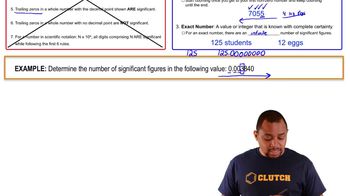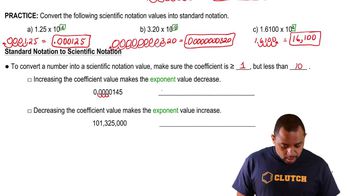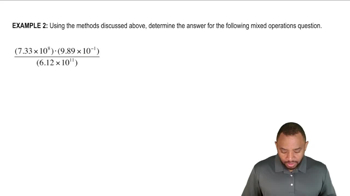Carry out the following operations and express the answers with the appropriate number of significant numbers. (c) (3.29×104)(0.2501)

Carry out the following operations and express the answers in exponential notation with the appropriate number of significant figures.
a. 2.791×104 + 8.76×103
b. 4.67×102 − 5.4437×104
c. (2.481×10−2 + 7.33×10−4) × (1.924×10−2 + 6.70)
d. (1.3×10−4 − 3.746×10−2)/(1.3×102 − 3.746×104)
 Verified step by step guidance
Verified step by step guidance
Verified video answer for a similar problem:
Key Concepts
Significant Figures

Exponential Notation

Order of Operations

Carry out the following operations and express the answers with the appropriate number of significant numbers. (d) 0.0588/0.677
Carry out the following operations and express the answers with the appropriate number of significant numbers. (a) 320.5 − (6104.5/2.3)
Carry out the following operations and express the answers in exponential notation with the appropriate number of significant figures.
a. 2.791×104 + 8.76×103
b. 4.67×102 − 5.4437×104
c. (2.481×10−2 + 7.33×10−4) × (1.924×10−2 + 6.70)
d. (1.3×10−4 − 3.746×10−2)/(1.3×102 − 3.746×104)
You have a graduated cylinder that contains a liquid (see photograph). Write the volume of the liquid, in milliliters, using the proper number of significant figures.
What are the conversion factors needed to convert the following? c. km to ft
